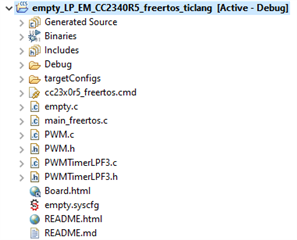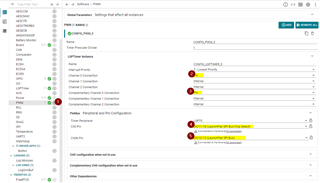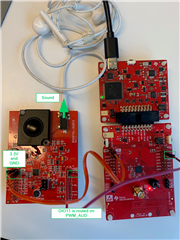Other Parts Discussed in Thread: BOOSTXL-AUDIO, SYSCONFIG
Hi,
Here is a step by step guide showing how to use the PWM example to produce a siren-like sound.
The example is based on F3 SDK 7.20.00.29.
A BOOSTXL-AUDIO is used to turn the PWM into sound (but other hardware could also be considered).
1- Apply the PWM patch by copy pasting the content of this zip file into the SDK installation (only required for SDK 7.20.00.29) /cfs-file/__key/communityserver-discussions-components-files/538/7532.pwm_5F00_patch.zip
2- If not already done, open CCS, create a workspace and configure it to use FreeRTOS.
3- Import the empty project from the SDK. For sanity, build the project once.
4- Copy in the project the files PWM.c, PWM.h, PWMTimerLPF3.c, PWMTimerLPF3.h. These files are in the folder <SDK>\source\ti\drivers.

5- Configure the PWM driver in SysConfig. Note that we enable the PWMsignal and its complementary channel (even if it not used here).

Once done, save, and close SysConfig.
6- Modify the code to use the PWM driver. I mainly used the code snippets provided in PWM.h.
All the changes are made in the empty.c file (the content should be used to replace the content of empty.c)
/*
* ======== empty.c ========
*/
/* For usleep() */
#include <unistd.h>
#include <stdint.h>
#include <stddef.h>
/* Driver Header files */
#include <ti/drivers/GPIO.h>
#include <ti/drivers/PWM.h>
/* Driver configuration */
#include "ti_drivers_config.h"
/*
* ======== mainThread ========
*/
void *mainThread(void *arg0)
{
/* 10 ms delay */
uint32_t time = 10000; //us
const uint32_t PWM_PERIOD_MIN = 1000; //1kHz
const uint32_t PWM_PERIOD_MAX = 8000; //8kHz
const uint32_t PWM_PERIOD_STEP = 10; //10Hz
int pwmIncrement = PWM_PERIOD_STEP;
uint32_t pwmPeriodValue = PWM_PERIOD_MIN;
/* Call driver init functions */
GPIO_init();
/* Configure the LED pin */
GPIO_setConfig(CONFIG_GPIO_LED_0, GPIO_CFG_OUT_STD | GPIO_CFG_OUT_LOW);
/* Turn on user LED */
GPIO_write(CONFIG_GPIO_LED_0, CONFIG_GPIO_LED_ON);
PWM_Handle pwm;
PWM_Params pwmParams;
PWM_init();
PWM_Params_init(&pwmParams);
pwmParams.idleLevel = PWM_IDLE_LOW;
pwmParams.periodUnits = PWM_PERIOD_HZ;
pwmParams.periodValue = 1000;
pwmParams.dutyUnits = PWM_DUTY_FRACTION;
pwmParams.dutyValue = (uint32_t) (((uint64_t) PWM_DUTY_FRACTION_MAX * 50) / 100); // 50% duty cycle
pwm = PWM_open(CONFIG_PWM_0, &pwmParams);
PWM_start(pwm);
if (pwm == NULL) {
// PWM_open() failed
while (1);
}
while (1)
{
usleep(time);
GPIO_toggle(CONFIG_GPIO_LED_0);
pwmPeriodValue += pwmIncrement;
if(pwmPeriodValue < PWM_PERIOD_MIN)
{
pwmIncrement = PWM_PERIOD_STEP;
pwmPeriodValue += pwmIncrement;
}
else if(pwmPeriodValue > PWM_PERIOD_MAX)
{
pwmIncrement = -PWM_PERIOD_STEP;
pwmPeriodValue += pwmIncrement;
}
PWM_setPeriod(pwm, pwmPeriodValue);
}
}
7- Build and run the code
8- Results:


I hope this will help,
Best regards,

